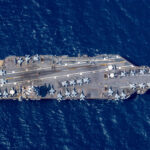
Sen. Lindsey Graham (R-S.C.), a prominent voice on foreign policy and close ally of President Donald Trump, raised the specter of U.S. ground operations in Venezuela during an October 26 appearance on CBS’s “Face the Nation,” describing land strikes as a “real possibility” to remove President Nicolás Maduro and disrupt drug trafficking networks.
Graham, appearing alongside host Margaret Brennan, tied the comments to ongoing U.S. maritime strikes against suspected narco-terrorist vessels off Venezuela’s coast, which have resulted in at least 32 deaths since early September. He invoked historical precedents like the 1989 Panama invasion under President George H.W. Bush, where U.S. forces ousted drug-linked dictator Manuel Noriega, and the 1983 Grenada operation, framing both as models for addressing threats in America’s “backyard.”
The senator’s remarks — delivered after Brennan pointed out that the U.S.’s most advanced aircraft carrier, the USS Gerald R. Ford (CVN-78), has been deployed toward the Caribbean / Latin American region as of late October 2025 — mark an escalation in rhetoric as the administration weighs broader military involvement. As Brennan pointed int, “You don’t need an aircraft carrier to hit drug boats,” Brennan pointed out.
Graham explicitly endorsed the idea of deposing Maduro, who faces U.S. indictments on drug-trafficking charges, and extending actions to Colombia, which he accused alongside Venezuela of serving as “safe havens for narco-terrorists for too long.” “I think President Trump’s made a decision that Maduro, the leader of Venezuela, is an indicted drug trafficker, that it’s time for him to go,” Graham said, adding that Trump had informed him of plans to brief Congress upon returning from Asia about “future potential military operations against Venezuela and Colombia.” He described the briefing as covering a possible expansion “from the sea to the land,” without specifying timelines or troop numbers, but emphasized that such moves would protect Americans from fentanyl and other drugs killing over 100,000 annually, per Centers for Disease Control and Prevention data. Graham dismissed concerns from critics like Sen. Rand Paul (R-Ky.), who has labeled the strikes “summary executions,” insisting, “This is not murder. This is protecting America from being poisoned by narco-terrorists coming from Venezuela and Colombia.”
The interview unfolded against a backdrop of heightened U.S. military posture in the region, including the deployment of B-52 bombers for patrols off Venezuela’s coast, 10% of the Navy’s fleet in the Caribbean, and 10,000 troops stationed in Puerto Rico, some on St. Croix in the USVI, and aboard amphibious ships. Graham referenced these assets as evidence of Trump’s resolve, noting the administration’s designation of Venezuelan cartels like the Cartel de los Soles as foreign terrorist organizations, enabling a “non-international armed conflict” framework under the 2001 Authorization for Use of Military Force. He drew parallels to past interventions, stating, “Panama and Grenada are two examples in our backyard, where Republican presidents chose to go after countries and leaders that were threatening our people.” The senator also highlighted alleged ties between Venezuelan networks and Hezbollah, which he said is partnering with cartels amid Iran’s financial strains, though U.S. intelligence assessments have long noted such connections without confirming direct Maduro involvement.
Reactions to Graham’s comments were swift and divided, with international leaders expressing alarm over the prospect of ground campaigns. Colombian President Gustavo Petro, whose government has urged adherence to international law following recent U.S. strikes in the Pacific off Colombia’s coast, reiterated calls for diplomacy in a statement hours after the broadcast, warning of a “war scenario” that could destabilize the hemisphere. Venezuelan Foreign Minister Yván Gil condemned the remarks as “imperialist threats” in a UN Security Council filing, demanding an emergency session and vowing enhanced coastal defenses. Within the U.S., Democrats like Sen. Jeanne Shaheen (D-N.H.) called for immediate War Powers Resolution consultations, stating in a Senate floor address that “escalation without congressional oversight risks repeating costly quagmires.” Graham, however, pushed back during the interview, arguing the operations align with the Monroe Doctrine’s spirit of hemispheric security.
Graham’s appearance on “Face the Nation” also touched on broader Trump administration priorities, including the ongoing government shutdown, but foreign policy dominated as he defended the strikes’ legality under self-defense provisions of the U.N. Charter. He acknowledged the involvement of ground troops in his historical examples, responding affirmatively to Brennan’s clarification: “Yes. Yes, I think that’s a real possibility.” The senator outlined the endgame as ensuring “Venezuela and Colombia cannot be used to poison America,” with Maduro’s removal central to neutralizing threats from indicted networks. Trump, traveling in Asia for trade talks, has not publicly commented on the briefing plans, but White House Press Secretary Karoline Leavitt confirmed in a pool report that “the president remains committed to briefing relevant committees on national security matters.”
British Caribbean News

